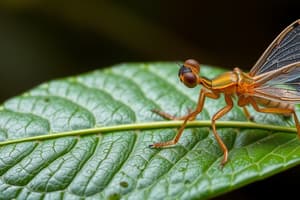Podcast
Questions and Answers
What process is primarily responsible for the survival and reproduction of organisms with advantageous traits?
What process is primarily responsible for the survival and reproduction of organisms with advantageous traits?
- Mutation
- Natural Selection (correct)
- Genetic Drift
- Isolation
Which of the following best describes the Linnaean taxonomy?
Which of the following best describes the Linnaean taxonomy?
- A classification system based solely on genetic makeup
- An early philosophy of biology based on personal observation
- A way to classify organisms into hierarchical groups (correct)
- A method to study molecular interactions
What is the main focus of molecular biology?
What is the main focus of molecular biology?
- Interactions between biological molecules (correct)
- The processes of cell division
- The study of cellular structures
- The examination of ecosystems
Which major advancement in biology occurred in the 19th century?
Which major advancement in biology occurred in the 19th century?
What is one application of biological knowledge in today's society?
What is one application of biological knowledge in today's society?
Which characteristic is essential for an organism to maintain stability in its internal environment?
Which characteristic is essential for an organism to maintain stability in its internal environment?
What is the primary focus of microbiology?
What is the primary focus of microbiology?
Which branch of biology focuses on the relationships between organisms and their environment?
Which branch of biology focuses on the relationships between organisms and their environment?
What does the process of adaptation enable organisms to do?
What does the process of adaptation enable organisms to do?
Which of the following is NOT a characteristic of living organisms?
Which of the following is NOT a characteristic of living organisms?
What do genetics primarily study within living organisms?
What do genetics primarily study within living organisms?
In what way do living organisms exhibit cellular organization?
In what way do living organisms exhibit cellular organization?
What does metabolism encompass in living organisms?
What does metabolism encompass in living organisms?
Flashcards
Natural Selection
Natural Selection
A process where organisms with advantageous traits survive and reproduce, passing traits to offspring.
Classification
Classification
Systematic ordering of organisms into groups based on shared characteristics.
Cell Biology
Cell Biology
Study of cells, their structure, function, and processes like metabolism and division.
Biochemistry
Biochemistry
Signup and view all the flashcards
Molecular Biology
Molecular Biology
Signup and view all the flashcards
Biology
Biology
Signup and view all the flashcards
Cellular organization
Cellular organization
Signup and view all the flashcards
Metabolism
Metabolism
Signup and view all the flashcards
Homeostasis
Homeostasis
Signup and view all the flashcards
Heredity
Heredity
Signup and view all the flashcards
Adaptation
Adaptation
Signup and view all the flashcards
Botany
Botany
Signup and view all the flashcards
Evolution
Evolution
Signup and view all the flashcards
Study Notes
Introduction to Biology
- Biology is the scientific study of life and living organisms, encompassing their structure, function, growth, origin, evolution, and distribution.
- It's a broad field with many specialized areas, including botany (plants), zoology (animals), microbiology (microorganisms), ecology (organism-environment interactions), and genetics (heredity).
- Biology relies on observation, experimentation, and analysis to understand biological phenomena.
Key Characteristics of Living Organisms
- Living organisms share fundamental characteristics:
- Cellular organization: All living things are composed of cells, the basic units of life.
- Metabolism: The sum of chemical reactions within an organism, involving energy acquisition and use.
- Growth and development: Organisms increase in size and complexity, following specific patterns.
- Reproduction: Organisms produce offspring, ensuring species continuity.
- Response to stimuli: Living things react to environmental changes, from simple plant responses to complex human reactions.
- Homeostasis: Maintaining a stable internal environment despite external fluctuations.
- Heredity: Passing genetic information from one generation to the next.
- Adaptation: Organisms becoming better suited to their environment over time.
Major Branches of Biology
- Botany: Studies plants—structure, function, classification, evolution, and ecology.
- Zoology: Focuses on animals—structure, function, classification, evolution, and ecology.
- Microbiology: Explores microorganisms (bacteria, viruses, fungi, protists).
- Genetics: Studies genes, heredity, and variation in organisms, including DNA, RNA, and protein synthesis.
- Ecology: Examines organism-environment relationships, species interactions, and ecosystem energy flow.
- Physiology: Investigates the functions of living organisms and their parts, from organ function to cellular mechanisms.
Fundamental Concepts in Biology
- Evolution: Species change over time, driven by natural selection. Organisms with advantageous traits survive and reproduce, passing on those traits.
- Classification: Systematic ordering of organisms into groups based on shared characteristics, often using hierarchical systems like Linnaean taxonomy.
- Cell Biology: Studies cells—structure, function, and processes like cell division, metabolism, and communication.
- Biochemistry: Examines the chemical processes in living organisms, including biological molecule structure and function (carbohydrates, lipids, proteins, nucleic acids).
- Molecular Biology: Investigates biological processes at the molecular level, focusing on molecular interactions.
History of Biology
- Early biology relied heavily on observation and natural philosophy.
- The scientific method's rise in the 17th and 18th centuries, alongside microscopy advancements, led to significant organism structure and function discoveries.
- Charles Darwin's theory of evolution by natural selection revolutionized biology in the 19th century.
- 20th and 21st-century advancements in genetics and molecular biology deepened our understanding of biological mechanisms.
Importance of Biology
- Understanding life's fundamental processes.
- Providing insights into human health and disease.
- Developing solutions for environmental issues.
- Applying biological knowledge in agriculture, medicine, and biotechnology.
- Promoting conservation and sustainable practices for biodiversity protection.
Studying That Suits You
Use AI to generate personalized quizzes and flashcards to suit your learning preferences.




